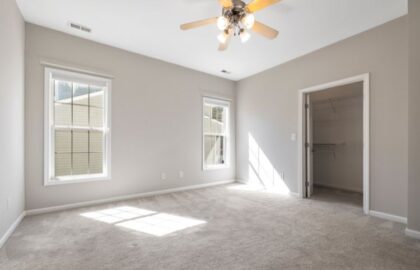
When a tenancy agreement comes to an end, landlords or assigned property managers conduct a final inspection of the property. This offers a chance to assess if the property has been left in satisfactory condition as required under the rental agreement.
This begs the question, can a tenant be present for a final inspection?
While there is no legal requirement for tenants to be there, attending the final inspection can be highly beneficial for both landlords and tenants in many situations.
TL;DR
While tenants have no legal right to attend final inspections in Australia, being present offers benefits. It allows tenants to provide context, demonstrate cleaning, contest bond claims and gain transparency.
Landlords and assigned property managers should accommodate tenant involvement as much as possible to ensure fair outcomes for both parties.
What Is a Final Inspection?
A final inspection, sometimes called an exit property condition report, is a key part of concluding a tenancy. It involves the landlord or appointed real estate agent coming to the rental property to assess its condition.
This final inspection will be compared to the original condition report completed at the start of the tenancy, known as an entry condition report.
The purpose is to see if the property has been maintained in reasonable condition and identify any cleaning, repairs or damages needed.
This allows the landlord to determine if the rental security bond needs to be claimed to cover rectification work.
It is standard practice under tenancy laws in Queensland for a final inspection to be completed. The Residential Tenancies and Rooming Accommodation Act 2008 states that tenants must be given an inspection notice providing a reasonable window for the inspection.
This is typically 7-14 days. Tenants are expected to provide access and have the property in a relatively clean condition with all their belongings removed.
The final inspection may also involve checking the property’s security, taking metre readings, and ensuring the tenant has upheld obligations around pool/garden maintenance if applicable.
Should a Tenant Be Present?
There is no legal requirement for a tenant to be present during the final inspection. Landlords and real estate agents can conduct inspections on their own at an arranged date and time.
However, it is often highly recommended and beneficial for the tenant to attend the inspection if possible, for reasons we’ll be covering shortly.
Attending the final inspection is really about opening clear communication channels between both parties. Issues are typically easier to resolve when all stakeholders are present.
Benefits of the Tenant Being There
If a tenant takes the opportunity to be present at a final inspection, some key benefits include:
- The tenant can point out repairs or maintenance issues that occurred during the tenancy that require the landlord’s attention. This provides helpful context on faults.
- They can demonstrate the effort taken to clean carpets, appliances etc and prepare the property before returning it. Thorough cleaning may not always be noticeable later.
- For any damages noted, the tenant can explain the causes and context openly to the agent or landlord. For example, they could point out appliance faults, carpets soiled by previous pets, or damage occurring from a storm or break-in. This may help prevent unfair accusations of neglect.
- It allows tenants the chance to contest any proposed rental bond deductions immediately, rather than just receiving a list of claims later on. Open negotiation can happen on the spot.
- Tenants can ask questions and clarify anything they are unsure about in relation to the property’s condition. It avoids potential misunderstandings.
Downsides of Tenant Being Present
While there are clear benefits in attending the final inspection, there are also some potential downsides for tenants:
- Inspections can sometimes create an uncomfortable or tense atmosphere if there are disputes or disagreements. Being present may add further stress.
- Major damage or neglect identified may be harder to dispute constructively on the spot. It may be better to allow the inspection first and review claims later.
- Inspections with tenants present can take longer. If tenants are busy on the final day, it may be easier to let the landlord/agent inspect alone.
- If there are serious breaches or problems identified, this can be harder to resolve in the heated moment. Following up later in writing may be better.
Overall, the advantages will usually outweigh the negatives for tenants attending. But depending on circumstances like a difficult relationship with the landlord, sometimes non-attendance can be preferable.
Considerations to Allow for Tenant Presence
Ideally, final inspections should be scheduled at a time when the tenant can be present if possible. However, landlords/agents can proceed with the inspection at the arranged time whether the tenant is there or not.
Some considerations around facilitating tenant presence include:
- Scheduling the inspection for a suitable time when the tenant is anticipated to be available and on site already. This avoids creating an additional visit.
- If the agreed time is not workable for the tenant, allow reasonable flexibility to identify an alternative inspection time if notified promptly.
- If the tenant ultimately cannot be there in person, request they send a representative or advocate. This could be a family member or close friend able to act on their behalf.
- Offering to take photos during the inspection and share these afterwards. This provides helpful transparency if the tenant cannot attend for whatever reason.
- Checking if a virtual inspection is an option through video call technology. This also allows tenants to participate remotely if needed.
With constructive compromise from both parties, tenants can often be accommodated in the final inspection process.
Can a Tenant Refuse a Final Inspection?
Under Queensland tenancy legislation, tenants cannot unreasonably refuse a final inspection. After being given sufficient notice, tenants are expected to provide access and make the property available.
If a tenant repeatedly obstructs an inspection without a valid justification, the landlord/agent can issue a Notice to Remedy Breach. Failure to comply with this notice may then lead to a tribunal application to gain access or even termination of the tenancy.
Of course, inspections should be at reasonable times and tenants can request an alternative time/date if they have a legitimate reason. But outright refusal of a property inspection planned with appropriate notice periods contravenes tenancy laws.
Tenants could miss the opportunity to contest any claims about the property’s condition and forfeit their bond as a result.
Wrap-Up
While Australian tenancy laws do not require tenants to be present during final inspections, attending offers many benefits. It provides an opportunity to give context, demonstrate cleaning efforts, contest claims, and gain peace of mind through transparency.
With some flexibility around timing and alternatives like photos or virtual inspections, landlords and agents should aim to facilitate tenant involvement if possible for a fair outcome.
Clear communication is key!







